|
 Secure Site
Secure Site
|
 |
Archive for May, 2012
 Once you experience the Zen Timepiece's progressive tones, you'll never want to meditate any other way. Mindfulness researcher Jon Kabat-Zinn explains how to live in the moment
There’s a movement afoot—at least among those who practice what’s known as “integrative medicine”—to focus on maintaining a state of optimal health rather than simply alleviating symptoms or treating a particular disease. These docs, nurses, and other health practitioners want us to be truly mindful of how we choose to nourish ourselves with food, activity, rest, and connections with others. In other words, what are we doing to keep from getting sick in the first place? That’s the question we need to ask ourselves every day, moment to moment, contends psychologist Jon Kabat-Zinn, founding director of the University of Massachusetts Medical School’s Center for Mindfulness in Medicine.
Studies have shown that mindfulness, a form of meditation in which you disengage yourself from strong beliefs, thoughts, and emotions, has a positive effect on brain function, lowering the stress response and increasing feelings of relaxation and well-being. It involves being truly present, even during those simple, mundane activities like washing dishes. It can remind you of the “reality of impermanence,” Kabat-Zinn writes in his bestselling book Full Catastrophe Living. “Here you are doing the dishes again. How many times have you done the dishes? How many more times will you do them in your life? What is this activity we call doing the dishes? Who is doing them? Why?”
At last week’s Institute of Medicine conference on integrative health, he outlined five strategies for using mindfulness to improve one’s health and achieve wellness.
1. Consider what‘s right with you. “Until you stop breathing, there’s more right with you than wrong with you,” says Kabat-Zinn. Every day, take a moment to thank your eyes for seeing, your liver for functioning, your feet for carrying you from place to place. Heck, thank those mitochondria within your cells for pumping out the energy you need to get you out of bed in the morning.
2. Love yourself unconditionally. Hate yourself for being 40 pounds overweight? Those berating thoughts you have about your imperfections can actually derail you instead of motivating you into action. (It’s that old story: Starve yourself as punishment for overeating, until you can’t take it anymore and give in to a binge.) Rather than setting a weight-loss goal and promising to love yourself once you get there, Kabat-Zinn says you need to make an effort to love yourself “all the way,” whether you’re 300 pounds or 150. If you decide to eat smaller portions or give up chips for carrot sticks, simply tell yourself, “This is just the way I’m eating now as a way to live better.”
3. Live in the present moment. Don’t think about what you ate yesterday or make promises to exercise tomorrow. “Every moment gives you the ability to learn, grow, and change,” explains Kabat-Zinn. “If you can take a moment and live as if it really mattered, you can take a step back and see those impulses that may be negative to your health.” What’s more, you’ll truly enjoy those indulgences like the creamy feel of a Godiva truffle or a 10-minute shoulder massage at an airport kiosk when your flight is delayed. You can also take pleasure in those small interactions with others: with the doorman, greeting you in your office lobby; the lady in line ahead of you at the supermarket; the goodnight hug from yourchild.
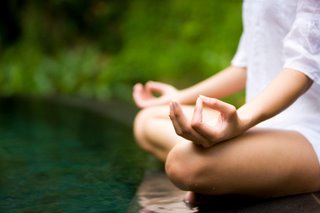 Our Gong Meditation Timer's exquisite sounds summon your consciousness out of your meditative state with a series of subtle gongs 4. When life gets tough, don‘t take it personally. When faced with job loss, a foreclosure, or an impending divorce, it’s really hard not to place the blame squarely on your own shoulders and get stuck in the “if only” mind-set. If only I had (choose one): taken a different job, bought a cheaper house, not cheated. That sort of rumination sets you up for full-blown depression. While it’s important to accept responsibility for your actions, the best way to do that is by looking to the present rather than the past. What are you going to do that’s different right now, at this moment, to move forward? “When the proverbial stuff hits the proverbial fan, it’s really important to recognize and acknowledge the fear you’re feeling,” says Kabat-Zinn. “But also recognize that it’s in these trying times that you will understand fully what it means to be human, to utilize all the resources you have.” After all, it’s those challenges faced by the World War II generation that earned it the distinction of being called the “greatest.”
5. Put the “being“ back in human. If you fill every moment with frenetic activity—work, text messaging, household chores, computer games—you never give yourself a chance to simply be. Too many of us are human stuff, the sum of our actions, instead of human beings, points out Kabat-Zinn. As corny as it sounds, just sitting for a moment to contemplate the clouds, the smell of freshly brewed coffee, the pattern of stalled cars winding around the freeway, is what separates us from the nut-gathering squirrels. And science shows it’s a great stress reliever, to boot.
Use our unique “Zen Clock” which functions as a Gong Yoga & Meditation Timer. It features a long-resonating acoustic chime that brings your meditation or yoga session to a gradual close, preserving the environment of stillness while also acting as an effective time signal. Our Yoga Timer & Clock can be programmed to chime at the end of the meditation or yoga session or periodically throughout the session as a kind of sonic yantra. The beauty and functionality of the Zen Clock/Timer makes it a meditation tool that can actually help you “make time” for meditation in your life. Bring yourself back to balance.
By DEBORAH KOTZ for US News
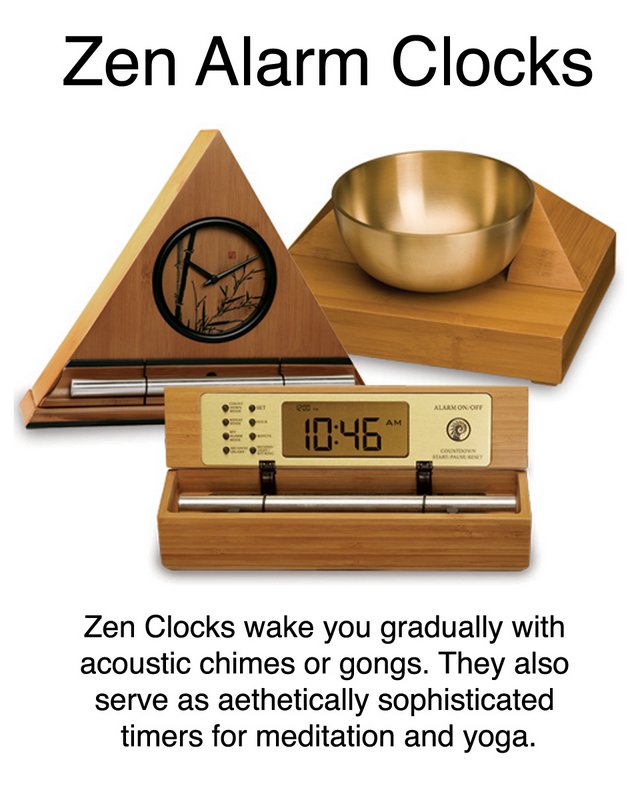 Bring yourself back to balance.
Posted in Meditation Tools
 How to Choose the Best Alarm Clock, get the Gradual Chime Clock Your body is a temple, so why not wake it respectfully and naturally with the gentle Tibetan bell-like chimes of the Zen alarm clock.
Gradually increasing over a 10-minute period, the chimes help ease you out of sleep and into your day. Not just for waking, the rhythm of the chimes is ideal for use during meditation and affirmation, as well as serving as a subtle signal for meeting times. The simple wood shape and lovely Japanese leaf-embellished dial will bring balance and beauty to either bedrooms or offices.
The Zen Alarm Clocks are decorative, highly functional (as both alarm clocks and timers for yoga and meditation), and environmentally friendly.
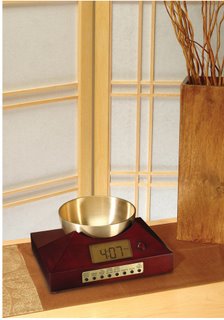 Tibetan-Bowl Gong Alarm Clocks with Natural, Acoustic Sounds Now & Zen Headquarter Store
1638 Pearl Street
Boulder, CO 80302
(800) 779-6383
Posted in Natural Awakening, Now & Zen Alarm Clocks, sleep, Sleep Habits
 Once you experience the Zen Timepiece's progressive tones, you'll never want to meditate any other way. A new study finds that people skilled at meditation seem able to turn off areas of the brain associated with daydreaming and psychiatric disorders such as autism and schizophrenia.
Learning more about how meditation works could help advance research into a number of diseases, according to lead author Dr. Judson Brewer, an assistant professor of psychiatry at Yale University.
He and his colleagues used functional MRI to assess brain activity in experienced and novice meditators as they performed three different meditation techniques.
Regardless of the type of meditation, skilled meditators had decreased activity in the brain’s default mode network, which has been linked to attention lapses and disorders such as anxiety, attention deficit hyperactivity disorder, and the buildup of beta amyloid plaques associated with Alzheimer’s disease.
The researchers also found that when the default mode network (which consists of the medial prefrontal and posterior cingulate cortex) was active, brain regions associated with self-monitoring and cognitive control were also activated in experienced meditators, but not novices.
This suggests that skilled meditators constantly monitor and suppress the emergence of “me” thoughts and mind wandering. If they become too strong, these two states of mind are associated with diseases such as autism and schizophrenia.
 Once you experience the Zen Timepiece's progressive tones, you'll never want to meditate any other way. The experienced meditators were able to co-activate the two brain regions both during meditation and while resting, which suggests they have developed a “new” default mode that’s more present-centered and less self-centered, the researchers said.
“Meditation’s ability to help people stay in the moment has been part of philosophical and contemplative practices for thousands of years,” Brewer said in a Yale news release. “Conversely, the hallmark of many forms of mental illness is a preoccupation with one’s own thoughts, a condition meditation seems to affect. This gives us some nice cues as to the neural mechanisms of how it might be working clinically.”
The study appears Nov. 21 in the Proceedings of the National Academy of Sciences.
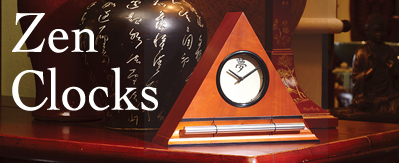 It's exquisite sounds summon your consciousness out of your meditative state with a series of subtle gongs. 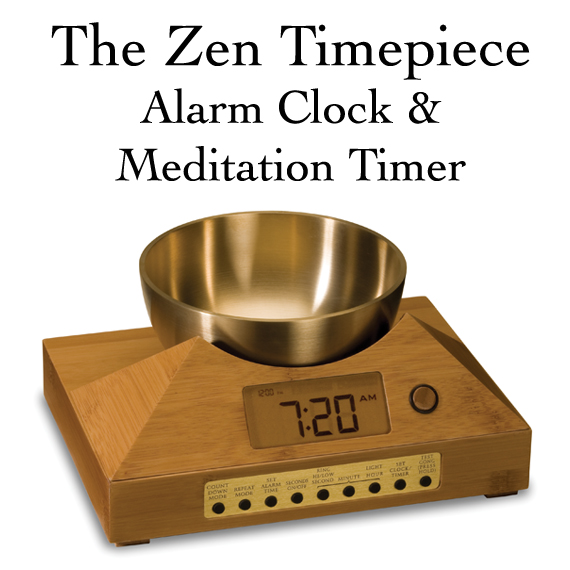 It's exquisite sounds summon your consciousness out of your meditative state with a series of subtle gongs. Now & Zen – Chime Meditation Timer Shop
1638 Pearl Street
Boulder, CO 80302
(800) 779-6383
orders@now-zen.com
Posted in Bamboo Chime Clocks
 Once you experience the Zen Timepiece's progressive tones, you'll never want to meditate any other way. New research indicates chanting and meditation help enhance mind/body health and balance. A study by the University of California-San Diego, the Alzheimer’s Prevention Foundation International, and the Amen Clinic of Newport Beach, California, found that Kirtan Kriya, a simple twelve minute Kundalini yoga meditation, increased oxygen delivery, blood flow, and energy in the brain, while improving neurotransmitter (chemical messengers of the brain that communicate with the body) function.
Kirtan Kriya involves chanting the Sanskrit words ‘Sa’ (meaning birth or cosmos), ‘Ta’ (life), ‘Na’ (completion), and ‘Ma’ (signifying rebirth). Here’s how to practice it: Repeat ‘Sa Ta Na Ma’ with your eyes closed while sitting with a straight spine; focus your mental energy on the area between your eyebrows. For two minutes, chant in your normal speaking voice; for the following three minutes, whisper. For the next three minutes, chant silently. Then reverse the order; whispering for two minutes and chanting the mantra aloud for two minutes. Enjoy your enlightenment!
 It's exquisite sounds summon your consciousness out of your meditative state with a series of subtle gongs. Use our unique “Zen Clock” which functions as a Yoga & Meditation Timer. It features a long-resonating acoustic chime that brings your meditation or yoga session to a gradual close, preserving the environment of stillness while also acting as an effective time signal. Our Yoga Timer & Clock can be programmed to chime at the end of the meditation or yoga session or periodically throughout the session as a kind of sonic yantra. The beauty and functionality of the Zen Clock/Timer makes it a meditation tool that can actually help you “make time” for meditation in your life. Bring yourself back to balance.
adapted from Healinglifestyles.com by Kyle Roderick
 Zen Alarm Clocks, made by Now & Zen, Inc., come in a variety of shapes and sizes. Now & Zen – The Tibetan Singing Bowl Meditation Timer
1638 Pearl Street
Boulder, CO 80302
(800) 779-6383
orders@now-zen.com
Posted in Meditation Timers, Meditation Tools, mindfulness practice
 Waking up in the morning should be as pleasant as falling asleep at night. The Zen Alarm Clock's gradual, gentle awakening is transformative. Shut-eye helps students integrate and retain information, study finds
Sufficient sleep improves college students’ ability to learn, a new study finds.
The study included 102 university undergraduate students who had never taken an economics course and were given an introductory lecture on supply and demand microeconomics. Those tested on the material after they got adequate sleep over a 12-hour period had better scores than those who took the test after being awake for 12 hours.
The findings show that sleep can help college students retain and integrate new information needed to solve problems on an exam.
“Our findings demonstrate the importance of sleep to the ability to flexibly combine distinct concepts to solve novel problems. This ability is critical to classroom learning,” lead author Michael Scullin, a doctoral candidate in the Behavior, Brain and Cognition program at Washington University in St. Louis, said in an American Academy of Sleep Medicine news release.
The test the students took included two types of problems: “basic” problems, which they had been taught how to solve; and “transfer” problems, which relied on the students being able to solve novel, but related problems using their newly acquired knowledge of supply and demand.
 Wake up with gradual, beautiful acoustic chimes. The Zen Alarm Clock transforms your mornings and gets you started right, with a progressive awakening “The most surprising finding of our study was that sleep, relative to an equal-length wake interval, benefited performance on the novel, ‘transfer’ integration problems without affecting performance on the basic, trained problems,” Scullin said.
The study was to be presented Tuesday at SLEEP 2011, an Associated Professional Sleep Societies meeting in Minneapolis. Research presented at medical meetings is considered preliminary until published in a peer-reviewed medical journal.
Boulder, Colorado—an innovative company has taken one of life’s most unpleasant experiences (being startled awake by your alarm clock early Monday morning), and transformed it into something to actually look forward to. “The Zen Alarm Clock,” uses soothing acoustic chimes that awaken users gently and gradually, making waking up a real pleasure. Rather than an artificial recorded sound played through a speaker, the Zen Clock features an alloy chime bar similar to a wind chime. When the clock’s alarm is triggered, its chime produces a long-resonating, beautiful acoustic tone reminiscent of a temple gong. Then, as the ring tone gradually fades away, the clock remains silent until it automatically strikes again three minutes later. The frequency of the chime strikes gradually increase over ten-minutes, eventually striking every five seconds, so they are guaranteed to wake up even the heaviest sleeper. This gentle, ten-minute “progressive awakening” leaves users feeling less groggy, and even helps with dream recall.
More information: Harvard Medical School has more about sleep. — Robert Preidt
SOURCE: American Academy of Sleep Medicine, news release, June 14, 2011
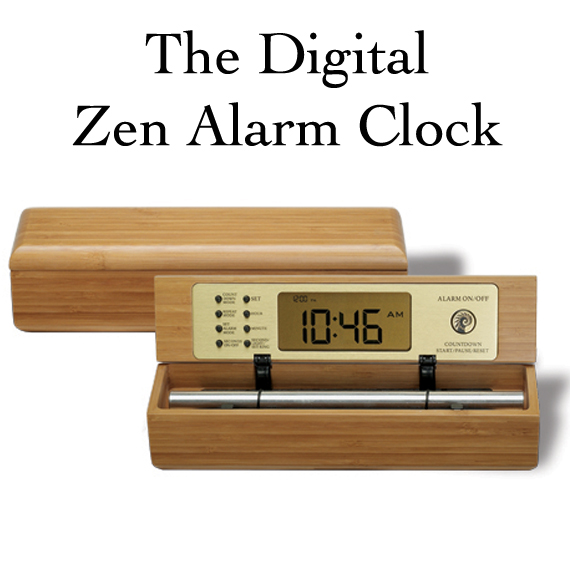 The Zen Alarm Clock transforms mornings, awakening you gradually with a series of gentle acoustic chimes Once you use a Zen Clock nothing else will do Now & Zen – The Acoustic Chime Alarm Clock Shop
1638 Pearl Street
Boulder, CO 80302
(800) 779-6383
orders@now-zen.com
Posted in sleep
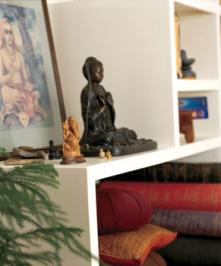 creating a meditation space in your home • It doesn’t really matter where your meditation space is located in your house, although Rodney Yee says the Balinese consider the northeast corner culturally and religiously auspicious. Tias Little likes the southeast corner because it captures morning light for early meditation. Basically, says Yee, pick a space where you feel relaxed and comfortable. “I think everybody has a special little place where they go to be quiet—just like a cat that searches until it finds the right spot to sleep.”
• You can think big thoughts in any size space. Your meditation area can be as expansive as Richard Freeman’s, a room “at the very top of the house, encompassed by a big maple tree,” or simply a spare closet or an empty corner. Rainbeau Mars likes a window for fresh air as long as it’s not distracting, but Little says a semi-enclosed space can give a “really spectacular feeling, like a little womb.” You might consider creating a six- or seven-foot-square adobe “cell” addition to your house or yard.
 meditation space • “Anyone can use [a meditation space], but only for meditation,” Deepak Chopra says. Freeman says to minimize distraction, you should choose a location that’s as isolated as possible from the traffic flow in your house, and it shouldn’t be in an area where you’re more tempted to sleep than meditate. If you share your space, each person should have his or her own chair, cushion, zabuton mat, or zafu pillow, “something that sanctifies this is my space,” Mars says. Sit on it only when you meditate. That helps create a ritual conducive to meditation, Judith Hanson Lasater says. It is nice to have a special Zen Meditation Timer on a table beside your the chair or cushion that you meditate on. This way you can easily reach the meditation timer to turn it off when it chimes and then you can continue to sit in peace until ready to move.
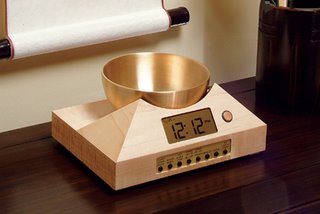 Zen Timepiece, a brass singing bowl clock and timer • Tatami mats or bare wood floors are a better, cleaner option than rugs or carpets, and they create a more spacious feeling, Little says.
• An altar is a good idea. “When you set it up, the space begins to get that special feeling,” Yee says. An altar makes it clear the space is reserved for meditation and serves as a repository for your sacred objects and decorations. It needn’t be elaborate: Little has seen window sills used as altars. Yee’s altar is a small, low table covered with a Balinese cloth; Freeman’s is a stone slab.
• If you do yoga in your meditation space, store props such as mats, blocks, and straps in a chest. Leaving them out creates distracting clutter.
• Avoid bright overhead lighting, or use a dimmer switch. Lamps or sconces are best because they combine illumination with warmth.
• Include a timer. Meditation is all about discipline and consistency, and meditating a set amount of time each day can help achieve that, Lasater says. The Zen Timepiece chimes gently at the end of one’s meditation without startling one back to the here and now.
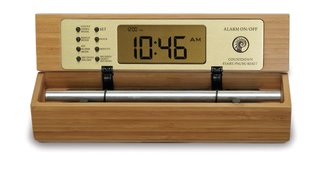 Bamboo Zen Meditation Timer • Even experts disagree on how to decorate your space. Most are minimalists. “It needs to be elegant in its simplicity and with very little clutter,” Chopra says. His recommended decorations include candles, books, and symbolic representations of archetypal figures such as gods, goddesses, angels, flowers, incense, and pastel colors. “You should not include anything that symbolically represents violence,” he adds. Yet not everyone finds minimalism calming, points out Freeman. “Some people display every saint they’ve ever heard of; some people may have only one. Others might light a candle; others prefer nothing. It’s whatever makes you want to sit there and do nothing.”
adapted from Natural Home Magazine, Jan/Feb 2005 by Vicky Uhland
Posted in Bamboo Chime Clocks, Japanese Inspired Zen Clocks, Meditation Timers, Meditation Tools, mindfulness practice, Well-being, Zen Timers
 Reduce Early Morning Anxiety with a Soothing Zen Alarm Clock How many times have you said to yourself – “I really need to get my wife a new Alarm Clock…I hate the one she has that beeps insensitively. The one that she pushes the snooze button on 5 times before she get up to turn it off?
Go ahead and Reduce Your Early Morning Anxiety and Get her the Chime Alarm Clock (Now & Zen, $124.95)
Use the Zen Alarm Clock with the Gradual Chime Sequence that is Acoustic.
The Original Zen Clock’s long-resonating Tibetan bell-like chime makes waking up a beautiful experience – its progressive chimes begin your day with grace. When the clock’s alarm is triggered, the acoustic chime bar is struck just once … 3-1/2 minutes later it strikes again … chime strikes become more frequent over 10 minutes … eventually striking every 5 seconds until shut off.
As they become more frequent, the gentle chimes will always wake you up – your body really doesn’t need to be awakened harshly, with a Zen Clock you’re awakened more gradually and thus more naturally. Unlike artificial recorded sounds coming out of a tiny speaker in a plastic box, natural acoustic sounds transform your bedroom or office environment.
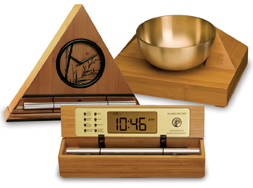 Gentle, Chime Zen Clocks for a Gradual Awakening Now & Zen’s Chime Alarm Clock Store
1638 Pearl Street
Boulder, CO 80302
(800) 779-6383
Posted in Natural Awakening, Now & Zen Alarm Clocks, wake up alarm clock
 Wake up refreshed, love your alarm clock, transform your mornings with The Zen Alarm Clock's progressive awakening with gentle chimes. Too busy to go to bed? Having trouble getting quality sleep once you do? Your health may be at risk
It’s National Sleep Awareness Week. Before hitting snooze on this news, consider that scheduling a good night’s sleep could be one of the smartest health priorities you set. It’s not just daytime drowsiness you risk when shortchanging yourself on your seven to nine hours. (More than 35 percent of adults routinely clock less than seven hours per night, according to the National Sleep Foundation.) Possible health consequences of getting too little or poor sleep can involve the cardiovascular, endocrine, immune, and nervous systems. In addition to letting life get in the way of good sleep, between 50 and 70 million Americans suffer from a chronic sleep disorder—such as insomnia or sleep apnea—that affects daily functioning and impinges on health. Here’s a look at the research:
1) Less may mean more. Among people who sleep under seven hours a night, the fewer zzzz’s they get, the more obese they tend to be, according to a 2006 Institute of Medicine report. This may relate to the discovery that insufficient sleep appears to tip hunger hormones out of whack. Leptin, which suppresses appetite, is lowered; ghrelin, which stimulates appetite, gets a boost.
2) You’re more apt to make bad food choices. A study published in 2008 in the Journal of Clinical Sleep Medicine found that people with obstructive sleep apnea or other severely disordered breathing while asleep ate a diet higher in cholesterol, protein, total fat, and total saturated fat. Women were especially affected.
3) Diabetes and impaired glucose tolerance, its precursor, may become more likely. A 2005 study published in theArchives of Internal Medicine found that people getting five or fewer hours of sleep each night were 2.5 times more likely to be diabetic, those getting six hours or fewer were 1.7 times more likely.
 Waking up in the morning should be as pleasant as falling asleep at night. The Zen Alarm Clock's gradual, gentle awakening is transformative. 4) The ticker is put at risk. A 2003 study found that heart attacks were 45 percent more likely in women who slept five or fewer hours per night than in those who got more. And a 2008 study in the Journal of the American Medical Association found that too little sleep promotes calcium buildup in the heart arteries, leading to the plaques that can cause heart attacks and strokes.
5) Blood pressure may increase. Obstructive sleep apnea, for example, has been associated with chronically elevated daytime blood pressure, and the more severe the disorder, the more significant the hypertension, suggests the 2006 IOM report. Obesity plays a role in both disorders, so losing weight can ease associated health risks.
6) Auto accidents rise. As stated in a 2007 report in the New England Journal of Medicine, nearly 20 percent of serious car crash injuries involve a sleepy driver—and that’s independent of alcohol use. Sleepiness affects professional drivers, too. The National Sleep Foundation’s 2012 Sleep in America poll, released Saturday, found that 20 percent of airline pilots admit they’ve made a serious error due to lack of sleep, compared with 18 percent of train operators and 14 percent of truck drivers.
7) Balance is off. Older folks who have trouble getting to sleep, who wake up at night, or are drowsy during the day could be 2 to 4.5 times more likely to sustain a fall, found a 2007 study in the Journal of Gerontology.
8) You may be more prone to depression. Adults who chronically operate on fumes report more mental distress, depression, and alcohol use. Adolescents suffer, too: One survey of high school students found similarly high rates of these issues. Middle schoolers, too, report more symptoms of depression and lower self-esteem.
9) You won’t be as nice. In general, sleep loss is likely to negatively affect your mood, causing irritability, impatience, and an inability to concentrate. A 2011 study in the Academy of Management Journal found that a lack of sleep increased deviant and unethical behavior, making people more rude and more likely to respond inappropriately in situations.
10) Your smarts may suffer. Sleep promotes learning, according to the Harvard Women’s Health Watch. It helps the brain commit new information to memory, and researchers have found that people who sleep after learning a task do better on later tests. In 2011, University of London scientists said that getting less than six to eight hours of sleep a night can age your brain by four to seven years—increasing the speed of cognitive decline, and worsening vocabulary and reasoning abilities.
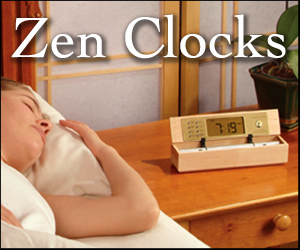 Wake up with gradual, beautiful acoustic chimes. The Zen Alarm Clock transforms your mornings and gets you started right, with a progressive awakening 11) Kids may suffer more behavior problems. Research from a 2008 issue of the Archives of Pediatric and Adolescent Medicine found that children who are plagued by insomnia, short duration of sleeping, or disordered breathing with obesity, for example, are more likely to have behavioral issues like attention deficit hyperactivity disorder.
12) You’ll look better. Beauty sleep is no myth: People are perceived as being less attractive and more unhealthy when they’re sleep-deprived than when they’re well-rested, according to research published in 2012 in the British Medical Journal. Swedish researchers photographed 23 volunteers on two occasions: Once, after getting eight hours of sleep, and again after being kept awake for 31 hours following five hours of sleep. None of the participants wore makeup and all were equally clean-shaven. More than 60 untrained observers rated the photos. Participants were judged to be 4 percent less attractive, 6 percent less healthy, and 19 percent more tired when they were sleep-deprived.
13) Death’s doorstep may be nearer. Those who get five hours or less per night have approximately 15 percent greater risk of dying—regardless of the cause—according to three large population-based studies published in the journals Sleep and the Archives of General Psychiatry.
Boulder, Colorado—an innovative company has taken one of life’s most unpleasant experiences (being startled awake by your alarm clock early Monday morning), and transformed it into something to actually look forward to. “The Zen Alarm Clock,” uses soothing acoustic chimes that awaken users gently and gradually, making waking up a real pleasure. Rather than an artificial recorded sound played through a speaker, the Zen Clock features an alloy chime bar similar to a wind chime. When the clock’s alarm is triggered, its chime produces a long-resonating, beautiful acoustic tone reminiscent of a temple gong. Then, as the ring tone gradually fades away, the clock remains silent until it automatically strikes again three minutes later. The frequency of the chime strikes gradually increase over ten-minutes, eventually striking every five seconds, so they are guaranteed to wake up even the heaviest sleeper. This gentle, ten-minute “progressive awakening” leaves users feeling less groggy, and even helps with dream recall.
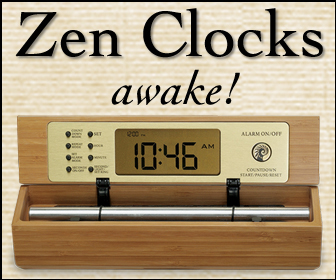 Wake up refreshed, love your alarm clock, transform your mornings with The Zen Alarm Clock's progressive awakening with gentle chimes. By SARAH BALDAUF, ANGELA HAUPT for US News
Now & Zen – The Soothing Chime Alarm Clock Store
1638 Pearl Street
Boulder, CO 80302
(800) 779-6383
orders@now-zen.com
Posted in sleep
 Waking up in the morning should be as pleasant as falling asleep at night. The Zen Alarm Clock's gradual, gentle awakening is transformative. Ukiyo-e Toshi Yoshida Sanbu Zaki Cherry Blossoms Sleeping too little or too much can have adverse effects, study finds
People who get six to nine hours of sleep each night rate their quality of life higher and are less likely to feel depressed than those who sleep less, according to a new study.
But, sleeping more than nine hours each night is ill-advised, the researchers found.
The study examined the records of 10,654 patients, who were about age 52 on average, over a two-year period. After accounting for differences in the participants’ age, gender, race and marital status, researchers gathered information on their quality of life, feelings of depression and sleep duration.
Among the findings, slated for presentation Tuesday at a meeting of the Associated Professional Sleep Societies in Minneapolis, those with a “normal” night’s sleep of six to nine hours reported high scores for quality of life and lower scores for depression severity, compared to short sleepers (fewer than six hours of sleep) and long sleepers (more than nine hours of sleep).
“These results are important because they provide more information about the importance of getting enough sleep, which is usually six to nine hours per night,” the study’s principal investigator, Dr. Charles Bae, neurologist at the Cleveland Clinic Sleep Disorders Center in Ohio, said in a news release from the American Academy of Sleep Medicine.
“People may already expect that their quality of life could be decreased when they do not get enough sleep, but they may not realize that sleeping too much can also have a negative impact,” Bae said.
Although sleep needs vary from person to person, most people require seven to eight hours of sleep each night to feel alert and well-rested during the day, according to the news release.
Because the study is to be presented in a meeting, the findings should be considered preliminary until published in a peer-reviewed journal.
 Wake up with gradual, beautiful acoustic chimes. The Zen Alarm Clock transforms your mornings and gets you started right, with a progressive awakening More information
The National Sleep Foundation provides more on sleep and depression.
— Mary Elizabeth Dallas
SOURCE: American Academy of Sleep Medicine, news release, June 14, 2011
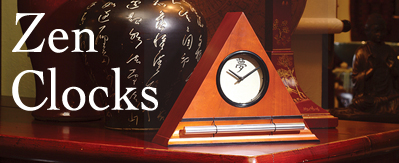 The Zen Alarm Clock transforms mornings, awakening you gradually with a series of gentle acoustic chimes Once you use a Zen Clock nothing else will do Now & Zen
The Acoustic Alarm Clock Store on Pearl Street Mall
1638 Pearl Street
Boulder, CO 80302
(800) 779-6383
orders@now-zen.com
Posted in Uncategorized
 Use our unique "Zen Clock" which functions as a Yoga & Meditation Timer Nearly half the time we’re awake, our thoughts drift to topics unrelated to whatever we’re doing, U.S. News reports. We think about a fight with our spouse when we’re driving, or replay events from a friend’s wild party while brushing our teeth in the morning. We text incessantly while watching TV, and phone mom during laundry-folding time. And while our minds wander—even when we’re having pleasant daydreams—we’re not very happy, according to a study published last year in the journal Science. “How often peoples’ minds wander is definitely a big predictor of who’s happy and who’s not happy,” says study author Matthew Killingsworth, a doctoral candidate in psychology at Harvard University, because the more often they take themselves out of the present moment, the less happy they are.
The study found that happiness falls when folks aren’t focused on the task at hand, even an unenjoyable one, like doing errands. The researchers used a novel approach to get real-time snapshots of what the 2,250 study participants were thinking and how they felt throughout the day. They developed a free iPhone app that buzzed volunteers, whose average age was 34, several times a day asking them how they were feeling right before they were contacted, what they were doing and whether they were thinking about something other than what they were doing. Except during sex, participants recorded their minds wandering during every activity; most frequently, minds drifted off during personal grooming like taking a shower, shaving, and putting on makeup.
 Our Yoga Timer & Clock can be programmed to chime at the end of the meditation or yoga session or periodically throughout the session as a kind of sonic yantra Use our unique “Zen Clock” which functions as a Yoga & Meditation Timer. It features a long-resonating acoustic chime that brings your meditation or yoga session to a gradual close, preserving the environment of stillness while also acting as an effective time signal. Our Yoga Timer & Clock can be programmed to chime at the end of the meditation or yoga session or periodically throughout the session as a kind of sonic yantra. The beauty and functionality of the Zen Clock/Timer makes it a meditation tool that can actually help you “make time” for meditation in your life. Bring yourself back to balance.
By ANGELA HAUPT from US News
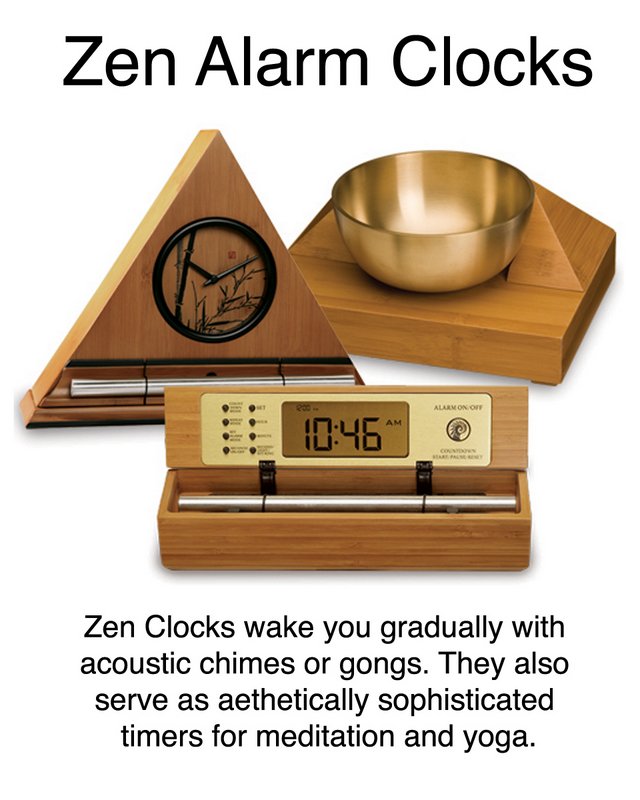 The beauty and functionality of the Zen Clock/Timer makes it a meditation tool that can actually help you "make time" for meditation in your life. Bring yourself back to balance. Now & Zen – The Singing Bowl Meditation Timer Store
1638 Pearl Street
Boulder, CO 80302
(800) 779-6383
Posted in Meditation Timers
« Previous Page — « Previous Entries
Next Entries » — Next Page »
|
|
|
|






























